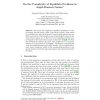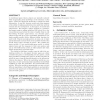16 search results - page 1 / 4 » On the Complexity of Succinct Zero-Sum Games |
COCO
2005
Springer
13 years 10 months ago
2005
Springer
We study the complexity of solving succinct zero-sum games, i.e., the games whose payoff matrix M is given implicitly by a Boolean circuit C such that M(i, j) = C(i, j). We comple...
AAAI
2007
13 years 7 months ago
2007
In normal scenarios, computer scientists often consider the number of states in a game to capture the difficulty of learning an equilibrium. However, players do not see games in ...
COCOON
2008
Springer
13 years 6 months ago
2008
Springer
We analyze the complexity of equilibria problems for a class of strategic zero-sum games, called Angel-Daemon games. Those games were introduced to asses the goodness of a web or g...
SIGECOM
2006
ACM
13 years 10 months ago
2006
ACM
In traditional game theory, players are typically endowed with exogenously given knowledge of the structure of the game—either full omniscient knowledge or partial but fixed in...
ATAL
2009
Springer
13 years 11 months ago
2009
Springer
In hedonic games, players have the opportunity to form coalitions, and have preferences over the coalitions they might join. Such games can be used to model a variety of settings ...


